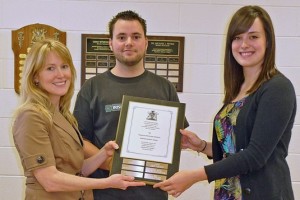
Biology professor Lisa Porter congratulates fourth-year students Nick Paquette and Samantha Dundas for their award-winning presentations at the department’s undergraduate research colloquium.
Not everything works the first time you do it, says Nick Paquette. That’s why the fourth-biology student was glad to have years to work on his undergraduate research project.
“I’ve been working in the lab since my second year,” he said as he prepared to deliver his paper, entitled The effects of Benzo[a]Pyrene on the developing mouse mammary gland, at the department’s annual colloquium last month.
The chemical is a well-known environmental carcinogen in large doses, Paquette said. He looked at low-dose exposure over the long-term in a colony of mice. He found that DNA damage was reduced if the subjects were lactating.
“It’s one more point of evidence that potentially suggests the ability to repair damaged tissues as a function of lactation,” he said, cautioning that the results were “very preliminary.”
Whether or not his research leads to treatment for cancer, he said the project was interesting: “It gives us the opportunity to apply these techniques we have learned over the years.”
His faculty advisor, Lisa Porter, praised the 44 students who presented at the colloquium.
“They get an amazing amount of work done in four years,” she said. “The quality of the projects demonstrates their focus; they do a really good job.”
Paquette took top honours in the colloquium’s Cell-Molecular category. First place in the Ecology, Evolution, Environment and Behaviour category went to Samantha Dundas for her project, Mechanisms of conspecific and heterospecific communication in black-capped chickadees.
Odion Kalaci and Jennifer Smith took second- and third-place prizes in Ecology, Evolution, Environment and Behaviour; Megan Byrne and Rami Mechael finished second and third, respectively, in the Cell and Molecular stream.
Source: UWindsor Daily News
